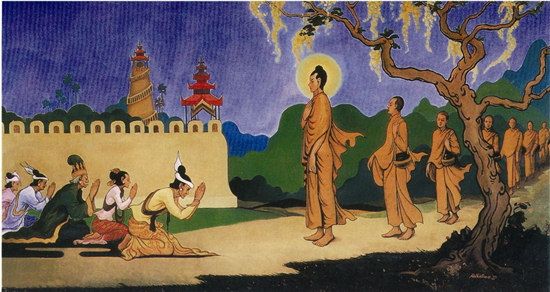|
Navam Full Moon Poya Day is on Tuesday:
Leading a life without greed, aversion and delusion
By Lionel Wijesiri
It appears as if our actions - what we do, say or think - simply
arise and then disappear without any trace except for their visible or
physical impact on other people and the environment. However, according
to the Buddha, all motivated actions, done knowingly or unknowingly,
create potential results that correspond to the moral quality of those
actions.
 |
|
The Buddha visits Rajagaha
where King Bimbisara came to pay homage. (How an artist
visualised it) |
This potential of our deeds to produce morally appropriate results is
known as karma.
Karmic potentiality brings fruits, good and bad, corresponding to the
deeds previously done and one’s latent tendencies. Such fruits may occur
immediately after the act is done, that is, in this life itself, or in
the next life, or in some subsequent life, that is, as long as one
remains unawakened from the sleep of karmic life.
As long as we remain in samsara, our accumulated karma will be
capable of producing and reproducing fruits whenever the conditions are
right, and keep on transfiguring itself into more complicated karmic
forms.
In terms of moral quality, the Suttas - such as the Mula Sutta, [The
roots of moral actions] found in Anguttara Nikaya, distinguish karma
into two major categories: the unwholesome (akusala) and the wholesome (kusala).
Unwholesome karma is “action that is spiritually detrimental to the
agent, morally reprehensible, and potentially productive of an
unfortunate rebirth and painful results.”
Their unwholesomeness comes from their roots, from which arise
secondary defilements such as selfishness, gluttony, envy, anger, pride,
arrogance, laziness, prejudice, and forgetfulness, and from which more
defiled actions arise.
Mula Sutta
In the Mula Sutta, Buddha speaks about three roots of what is
unskillful. These three toots of evils are known in Pali as lobha, dosa,
moha.
Lobha is greed, desire, craving, attachment. The Visuddhimagga gives
the its definition as follows: Lobha has the characteristic of grasping
an object like “monkey lime”. Its function is sticking, like meat put in
a hot pan. It is manifested as not giving up, like the dye of
lamp-black.
Its proximate cause is seeing enjoyment in things that lead to
bondage. Swelling with the current of craving, it should be regarded as
taking (beings) with it to states of loss, as a swift-flowing river does
to the great ocean.
Lobha has the characteristic of grasping like monkey lime. Monkey
lime was used by hunters to catch monkeys. A hunter sets a trap of lime
for monkeys. Monkeys who are free from “folly and greed” do not get
trapped. But a greedy, foolish monkey comes up to the pitch and handles
it with one paw, and his paw sticks fast in it.
Then, thinking: I’ll free my paw, he seizes it with the other paw,
but that too sticks fast.
To free both paws he seizes them with one foot, and that too sticks
fast. To free both paws and the one foot, he lays hold of them with the
other foot, but that too sticks fast. To free both paws and both feet he
lays hold of them with his muzzle: but that too sticks fast. So that
monkey thus trapped in five ways lies down and howls, thus fallen on
misfortune.
Dosa means anger, hatred, ill will, aversion. In the Visuddhimagga.
dosa is defined as follows: It has flying into anger or churlishness as
characteristic, like a smitten snake; spreading of itself or writhing as
when poison takes effect, as function; or, burning that on which it
depends as function, like jungle-fire; offending or injuring as
manifestation, like a foe who has got his chance; having the grounds of
vexation as proximate cause, like urine mixed with poison.
In Theravada tradition, moha is considered to be synonymous with
avijja, but the terms are used in different contexts. Ignorance (avijja)
is actually identical in nature with the unwholesome root “delusion” (moha).
When the Buddha speaks in a psychological context about mental
factors, he generally means “delusion”; when he speaks about the causal
basis of samsara, he means “ignorance”. Thus, the term avijja is used
when identifying the first causal link in the twelve links of dependent
origination, and moha is used when discussing the mental factors.
Tanha
On a deeper psychological level, these unwholesome roots arise from
and are fed by the three kinds of desire, that is, the desire for
sense-pleasures (Kana tanha), for becoming this and that (bhava tanha),
or for getting rid of something (vibhava tanh?). The roots of each of
these desires are very deep and called latent tendencies (anusaya),
which are basically, lust (raga), ill will (vyapada), and ignorance (avijja).
When there is a strong desire for something we are deluded into
thinking that nothing else is important except that desirable object;
this is kama tanha, worked up by lust as the dominant latent tendency.
 |
|
People who are easily
angered generally have what some psychologists call a low
tolerance for frustration |
As a result of this overpowering desire, we dislike thoughts or
objects that distract us from our quest; this is kama tanha working with
ill will. As a result of all this desiring and questing, we ignore
anything can really help us; this is the result of kama tanha rooted in
ignorance. Bhava tanha works in a similar way: when we want to become
something, be it making some money or attaining “eternal life,” the
latent tendencies of lust, ill will and ignorance work on our minds in
the same way; ignorance is the dominant latent tendency. So, too, in the
case of vibhava tanha, which arises when, for example, we think we have
failed in our quest for happiness; ill will is the dominant latent
tendency.
Removal
Today, in the 21st century, we see that the “intelligent” man, who
proudly believes himself to be a ‘free agent’ - the master of his life
and even of nature - is in his spiritually undeveloped state actually a
passive patient driven about by inner forces he does not recognise.
Pulled by his greed and pushed by his hatred, in his blindness he does
not see that the brakes for stopping these frantic movements are in his
reach, within his own heart.
One way of understanding the human mind is that its natural goodness
is often covered up by negative influences from outside and our
reactions to them, that is, the workings of lobha, dosa and moha tend to
prevent our natural tendency to do good.
The proper way to remove these unwholesome roots (at least
temporarily) is to carefully keep track of our mind. This mental
tracking is done in two ways that are mutually complementary: by calming
the mind and by insight.
By calming the mind, we clear away the unwholesome roots, and through
insight, we see directly into it, thus allowing their opposites,
generosity, loving kindness and wisdom, to arise.
For some, it is easier to cultivate insight first; for others,
calmness first. Either way, one helps to strengthen the other, so that
they work together like the two wings of a bird, lifting us above
unwholesome mental states.
In this way, we begin to have a right view of life, and are able to
understand and deal with suffering, so that we are in due course be
totally free from it. |

